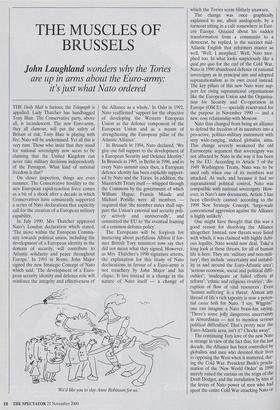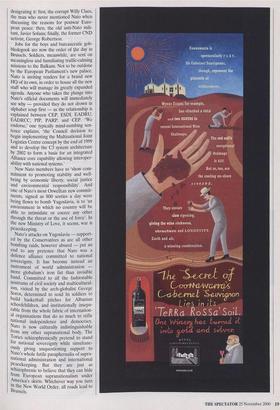THE MUSCLES OF BRUSSELS
John Laughland wonders why the Tories
are up in arms about the Euro-army: it's just what Nato ordered
THE Daily Mail is furious; the Telegraph is appalled; Lady Thatcher has handbagged Tony Blair. The Conservative party, above all, is incandescent. The new Euro-army, they all clamour, will put the safety of Britain at risk; Tony Blair is playing with fire; Nato will be undermined. Yet all this is very rum. Those who insist that they stand for national sovereignty now seem to be claiming that the United Kingdom can never take military decisions independently of the Pentagon. What kind of national freedom is that?
On closer inspection, things are even rummer. The Conservative hostility to the new European rapid-reaction force comes as a bit of a shock after a decade in which Conservatives have consistently supported a series of Nato declarations that explicitly call for the creation of a European military capability.
In July 1990, Mrs Thatcher approved Nato's London declaration which stated, `The move within the European Commu- nity towards political union, including the development of a European identity in the domain of security, will contribute to Atlantic solidarity and peace throughout Europe.' In 1991 in Rome, John Major signed the new Strategic Concept of Nato which said, 'The development of a Euro- pean security identity and defence role will reinforce the integrity and effectiveness of the Alliance as a whole.' In Oslo in 1992, Nato reaffirmed 'support for the objective of developing the Western European Union as the defence component of the European Union and as a means of strengthening the European pillar of the Atlantic Alliance'.
In Brussels in 1994, Nato declared, 'We give our full support to the development of a European Security and Defence Identity.' In Brussels in 1995, in Berlin in 1996, and in every Nato summit since then, a European defence identity has been explicitly support- ed by Nato and the Tories. In addition, the Maastricht Treaty itself — whipped through the Commons by the government of which William Hague, Francis Maude and Michael Fortino were all members required that 'the member states shall sup- port the Union's external and security poli- cy actively and unreservedly', and committed the EU to 'the eventual framing of a common defence policy'.
The Europeans will be forgiven for muttering about perfidious Albion if for- mer British Tory ministers now say they did not mean what they signed. However, as Mrs Thatcher's 1990 signature attests, the explanation for this litany of Nato declarations in favour of a Euro-army is not treachery by John Major and his clique. It lies instead in a change in the nature of Nato itself — a change of `We'd like you to slay Anne Robinson for us. ' which the Tories seem blithely unaware.
The change was once graphically explained to me, albeit analogously, by a turncoat sitting in a café somewhere in East- ern Europe. Quizzed about his sudden transformation from a communist to a democrat, he replied, in the succinct mid- Atlantic English that reformers master so well, 'Well, I morphed.' Well, Nato mor- phed too. In what looks suspiciously like a quid pro quo for the end of the Cold War, Nato in 1990 abandoned defence of national sovereignty as its principal aim and adopted supranationalism as its own creed instead. The key pillars of this new Nato were sup- port for rising supranational organisations like the European Union and the Organisa- tion for Security and Co-operation in Europe (OSCE) — specially reactivated for the purpose in November 1990 — and a new, cosy relationship with Moscow.
Nato thus changed from being an alliance to defend the freedom of its members into a pro-active, politico-military instrument with very wide-ranging, indeed globalist, aims. This change severely weakened the old Eurosceptic argument that sovereignty was not affected by Nato in the way it has been by the EU. According to Article 5 of the 1949 Washington Treaty, Nato was to be used only when one of its members was attacked. As such, and because it had no supranational political control, Nato was compatible with national sovereignty. How- ever, in Nato's new documents, Article 5 has been effectively canned: according to the 1999 New Strategic Concept, 'large-scale conventional aggression against the Alliance is highly unlikely'.
One might have thought that this was a good reason for dissolving the Alliance altogether. Instead, new threats were listed with which, it was claimed with highly dubi- ous legality, Nato would now deal. Take a long look at these threats, for all of human life is here. They are 'military and non-mili- tary'; they include 'uncertainty and instabil- ity in and around the Euro-Atlantic area'; `serious economic, social and political diffi- culties'; 'inadequate or failed efforts at reform'; 'ethnic and religious rivalries'; 'dis- ruption of flow of vital resources'. Even `human suffering' is a threat. Almost any thread of life's rich tapestry is now a poten- tial casus belli for Nato. 'I say, Wiggins!' one can imagine a Nato brass-hat saying. `There's some jolly dangerous uncertainty in Absurdistan — not to mention serious political difficulties! That's pretty near the Euro-Atlantic area, isn't it? Chocks away!'
The continuing Tory love of the new Nato is strange in view of the fact that, for the last decade, the Alliance has been controlled by globalists and men who devoted their lives to opposing the West when it mattered, dur- ing the Cold War. President Bush's procla- mation of the 'New World Order' in 1990 merely raised the curtain on the reign of the Draft Dodger, and the installation by him at the levers of Nato power of men who had spent the entire Cold War attacking Nato or denigrating it: first, the corrupt Willy Claes, the man who never mentioned Nato when discussing the reasons for postwar Euro- pean peace; then, the old anti-Nato mili- tant, Javier Solana; finally, the former CND activist, George Robertson.
Jobs for the boys and bureaucratic gob- bledegook are now the order of the day in Brussels. Soldiers, meanwhile, are sent on meaningless and humiliating traffic-calming missions to the Balkans. Not to be outdone by the European Parliament's new palace, Nato is inviting tenders for a brand new HQ of its own, in order to house all the new staff who will manage its greatly expanded agenda. Anyone who takes the plunge into Nato's official documents will immediately see why — provided they do not drown in alphabet soup first — as the relationship is explained between CEP, ESDI, EADRU, EADRCC, PfP, PARP, and CEP. 'We endorse,' one typically mind-numbing sen- tence explains, 'the Council decision to begin implementing the Multinational Joint Logistics Centre concept by the end of 1999 and to develop the C3 system architecture by 2002 to form a basis for an integrated Alliance core capability allowing interoper- ability with national systems.'
New Nato members have to 'show com- mitment to promoting stability and well- being by economic liberty, social justice and environmental responsibility'. And one of Nato's most Orwellian new commit- ments, signed as 800 sorties a day were being flown to bomb Yugoslavia, is to 'an environment in which no country will be able to intimidate or coerce any other through the threat or the use of force'. In the new Ministry of Love, it seems, war is peacekeeping.
Nato's attacks on Yugoslavia — support- ed by the Conservatives as are all other bombing raids, however absurd — put an end to any pretence that Nato was a defence alliance committed to national sovereignty. It has become instead an instrument of world administration more globalism's iron fist than invisible hand. Committed to all the fashionable nostrums of civil society and multicultural- Ism, visited by the arch-globalist George Soros, determined to send its soldiers to build basketball pitches for Albanian schoolchildren, and institutionally insepa- rable from the whole fabric of internation- al organisations that do so much to stifle national independence and democracy, Nato is now culturally indistinguishable from any other supranational body. The Tories schizophrenically pretend to stand for national sovereignty while simultane- ously giving unquestioning support to Nato's whole futile paraphernalia of supra- national administration and international peacekeeping. But they are just as schizophrenic to believe that they can hide from European supranationalism under America's skirts. Whichever way you turn in the New World Order, all roads lead to Brussels.






























































































 Previous page
Previous page